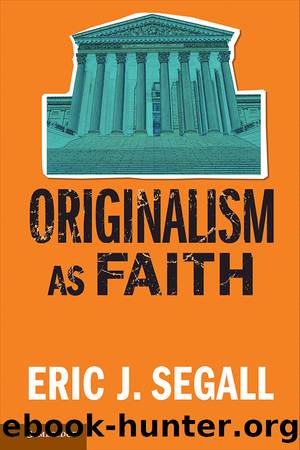Originalism As Faith (9781108117562) by Segall Eric J

Author:Segall, Eric J. [Segall, Eric J.]
Language: eng
Format: epub
ISBN: 9781107188556
Publisher: CambridgeUP
Published: 2018-10-27T00:00:00+00:00
7
The Non-Originalism of Justices Scalia and Thomas
Thomas will use originalism where it provides support for a politically conservative result, even if that support is weak ⦠But where history provides no support, heâs likely to ignore it altogether.
Doug Kendall and Jim Ryan1
I would conclude from his Taft Lecture and his behavior on the Court that Justice Scalia is simply not an originalist.
Randy Barnett2
Chapter 3 summarized a series of law review articles written by Professor Jacob tenBroek, who argued that as of his writing (1939), the justicesâ personal values and life experiences, not fidelity to text or ratification-era evidence, drove Supreme Court decisions.3 He supported his descriptive account in a five-part series that described how often the Court issued decisions irreconcilable with constitutional text and history. For the next few decades, there was little substantial academic debate about the relationship between originalism and constitutional decision making. As Professor Jamal Greene has observed, âoriginalism remained firmly on the margins of constitutional law for [these] ⦠decades.â4
After the Warren Courtâs aggressive liberal activism, however, came a renewed scholarly and judicial interest in using a rigorous text and originalist approach to cabin judicial discretion. Chapter 4 recounted the work of Judge Bork, Professor Raoul Berger, and others, who ignited what is todayâs much broader originalism debate. Even with the spread of originalism throughout the legal academy, the political world, and the citizenry, however, there has never been a modern Supreme Court Justice who voted consistently in an originalist manner.
The two justices (before Neil Gorsuch) who consistently self-identified as originalist, and who advocated for the doctrine on and off the Court, are Antonin Scalia and Clarence Thomas.5 A careful examination of their voting records and opinions, however, demonstrates that neither Justice practiced what they preached. This failure is emblematic of how impractical and unworkable originalism is as a method of constitutional interpretation unless it is attached to a strong presumption of validity for state and federal laws â a presumption neither justice consistently applied.6
Although Justices Scalia and Thomas both claimed the mantle of originalist,7 their ideologies have nuanced differences such as their use of precedent, tradition, and what evidence counts toward original meaning. However, both justices, in their opinions and in their off-the-Court writings, argued that judges should leave their personal values out of constitutional interpretation and only overturn the decisions of more accountable political officials when required to by text or history.8 For example, Justice Thomas has said that a judge must try hard to push away his âracial, social, or religious backgroundâ when interpreting the Constitution and that a judge âmust become almost pure, in the way that fire purifies metal, before he can decide a case. Otherwise, he is not a judge, but a legislator, for whom it is entirely appropriate to consider personal and group interests.â9
Similarly, Justice Scalia has on many occasions argued that a judgeâs only job in constitutional cases is to interpret text and original meaning and not to consider policy, consequences, or a judgeâs own values.10 For example,
Download
This site does not store any files on its server. We only index and link to content provided by other sites. Please contact the content providers to delete copyright contents if any and email us, we'll remove relevant links or contents immediately.
The Rule of Law by Bingham Tom(1689)
Philosophy of law a very short introduction by Raymond Wacks(1654)
Constitutional Theory by Carl Schmitt(1450)
The Quest for Cosmic Justice by Thomas Sowell(1356)
A Matter of Interpretation by Antonin Scalia(1309)
Hiding from Humanity: Disgust, Shame, and the Law by Martha C. Nussbaum(1192)
The Law by Frederic Bastiat(1161)
Philosophy of Law - A Very Short Introduction by Raymond Wacks(1114)
The Sovereignty of Human Rights by Macklem Patrick(1113)
Dignity, Rank, and Rights by Jeremy Waldron & Meir Dan-Cohen(1092)
An Introduction to the Philosophy of Law by Roscoe Pound(1080)
Superbia 2 by Bernard Schaffer(1077)
The Ages of American Law by Grant Gilmore(1074)
An Introduction to the Principles of Morals and Legislation by Jeremy Bentham(1072)
Emotional Dynamics of Law and Legal Discourse by Heather Conway John Stannard(1057)
The Law by Frédéric Bastiat(1022)
Zagrebelsky, Gustavo by La legge e la sua giustizia(1014)
Superbia (Book 3) by Schaffer Bernard(982)
Superbia (Book 2) by Schaffer Bernard(968)
